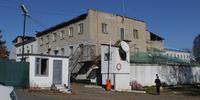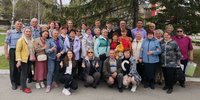The Case of Ponomarenko and Others in Luchegorsk
Filter
- #
N. A. Sorokina, Senior Investigator of the Investigative Directorate of the Investigative Committee of the Russian Federation for the Primorsky Territory, issues a decision to initiate criminal case No. 12102050012000058 against 62-year-old Yuriy Ponomarenko under Part 1 of Article 282.2 of the Criminal Code of the Russian Federation (organization of activities of an extremist association).
- #
Yuriy Ponomarenko's apartment is being searched, in which investigator Sorokina, three detectives and witnesses participate. A mobile phone, hard drive and postcards with Bible verses are seized from the believer. Security forces are also searching his garage.
- #
Yuriy Ponomarenko is summoned for interrogation to the Investigative Committee of the city of Dalnerechensk, which is 84 kilometers from the place of residence of the believer. During the interrogation, Sorokin reproduces an audio recording of Ponomarenko's telephone conversation three years ago as evidence of the believer's "guilt". When asked by the investigator who is talking and with whom, Ponomarenko uses Article 51 of the Constitution of the Russian Federation. After interrogation, the man is released on his own recognizance.
- #
- #
Yuriy Ponomarenko is included in the federal list of extremists and terrorists of Rosfinmonitoring. This means that certain financial restrictions are imposed on it.
- #
Senior detective of the PU FSB of Russia in the Primorsky Territory, Captain Vokhmyanin V.N. in the framework of the criminal case of Yuri Ponomarenko conducts a search in the apartment of 37-year-old Oleg Sergeev. During special events, a believer's phone, laptop and flash drives are seized.
- #
N. A. Sorokina, Senior Investigator of the Investigative Department for the City of Dalnerechensk of the Investigative Directorate of the Investigative Committee of the Russian Federation for the Primorsky Territory, charges Oleg Sergeev with committing a crime under Part 1 of Article 282.2 of the Criminal Code of the Russian Federation (organizing the activities of an extremist organization). The believer is interrogated as an accused. They take a written undertaking not to leave the place.
- #
Investigator Sorokin brings Oleg Sergeyev and Yuri Ponomarenko as accused. The ruling states that the believers had "the intent to organize the continuation of the activities of the said religious organization" and decided to "create a criminal group to commit serious crimes," which were, in fact, joint discussions of the teachings of the Bible. It also states that Oleg and Sergey remained "spiritual leaders" who continue to communicate with other believers on religious topics.
- #
67-year-old Nikolay Dikhtyar is being prosecuted under Part 2 of Article 282.2 of the Criminal Code of the Russian Federation. The investigation calls the communication of believers with each other and the conduct of worship services "criminal activity", which was "stable, cohesive in nature, which was expressed in the presence of a common conviction and intent to commit serious crimes among the leaders and participants of an organized group."
- #
The case of Yuriy Ponomarenko, Nikolay Dikhtyar and Oleg Sergeyev is submitted to the Pozharsky District Court of Primorsky Territory for consideration by Judge Atroshko M.N.
- #
The first hearing on the merits of the case. The court rejects the defendants' petitions to challenge their defense counsel.
- #
State prosecutor Svetlana Mekesheva reads out the charges. The defendants express their attitude towards him. They explain that their "faith does not depend on the existence of a local religious organization" (legal entity), and the Supreme Court of the Russian Federation by its decision "did not prohibit Jehovah's Witnesses from holding joint meetings."
Two witnesses are being interrogated, one of whom is FSB officer P. Vasin. Both witnesses confirm that the defendants did not encourage them to do anything and did not distribute any literature.
- #
The questioning of witnesses is ongoing. They give the defendants positive characteristics. For the rest of the questions, they enjoy the right not to testify against themselves and their loved ones.
- #
"My son is a believer, reads the Bible, lives according to the laws of God, talks about God, respects people, he is being judged for this," the defendant's mother says during interrogation. The witness adds that her son treats representatives of other faiths well, she has never heard from him negative statements about anyone, calls for genocide and repression.
Prior to this, the court refused to discuss the petition for publicity of the trial and admission of listeners to the hall. Because of this, more than 50 people were left waiting for news from the courtroom on the street.
At the previous hearing, the defendant was not allowed to express his attitude to the charges. In this regard, the lawyer asks to provide this opportunity again. After the recess, the judge grants the request.
- #
The court interrogates 5 witnesses, including FSB officer Vasin, who says that of the accused he knows only Ponomarenko, because he is his neighbor. According to the witness, he did not know the other defendants. The prosecutor reads out the materials of Vasin's interrogation, according to which Dikhtyar came to his house together with Sergey Sergeev. When asked by the state prosecutor whether Vasin confirms this, he answers in the affirmative.
- #
The court examines the written materials of the criminal case.
- #
The defendants make written notes. Believers say that they do not know Anton Virich , and Valery Vyaznikov, who is a defendant in a similar case, has not been seen for more than 10 years.
Yuriy Ponomarenko says that he did not enter into a criminal conspiracy with anyone. He adds: "In the audio recording, which is used as evidence of my guilt, I do not hold a meeting of the LRO, but a Christian meeting of a group of believers, at which attention is drawn to the mercy of God and Christ. At the same time, I want to emphasize that nothing I said incites hatred towards other religions, and there was no criminal motive in my actions."
Oleg Sergeyev states: "The prosecution mistakenly mixes two types of activities: the practice of religion by individuals and the activities of a legal entity. Why can't I, as an individual, freely believe in God without being accused of continuing the activities of a legal entity to which I have never been related?"
Similar thoughts are voiced by Nikolay Dikhtyar in his speech: "I simply profess the religion of Jehovah's Witnesses. This is not the same as continuing the activities of the liquidated LRO."
- #
- #
The case materials are being examined. Among them is a greeting card addressed to the Ponomarenko family, a poem and a document addressed to the wife of Yuri Ponomarenko.
- #
The court hears audio files from the case file - recordings of telephone conversations of the defendants from November 2018 to February 2019.
- #
The court examines the materials of the case: audio, video and text files, including recordings of conversations of the defendants with relatives, friends and fellow believers, as well as secret recordings of meetings of the defendants with an operational officer who portrayed interest in the Bible.
- #
The Court concludes that the content of the audio and video materials of the case is exclusively "thematic, religious" in nature. The court decides to limit further research of materials - songs, films, animated animation - to selective viewing and listening.
- #
Evidence of the defense is examined. Nikolay Dikhtyar provides information on the ECHR judgments in the cases of The Religious Community of Jehovah's Witnesses in Moscow and Others v. the Russian Federation and Konstantin Kuznetsov and Others v. the Russian Federation. He emphasizes that these rulings recognized violations by the Russian Federation of the legitimate rights and freedoms of Jehovah's Witnesses in Russia.The defense reads out positive characteristics of the defendants from neighbors and from places of work.
- #
The defense asks the court to postpone the hearing due to the family circumstances of Oleg Sergeev - his wife got into a car accident. The court grants the request.
- #
The prosecutor requested suspended term for the defendants: Yuriy Ponomarenko — 4 years, Oleg Sergeyev — 3 years and 6 months, and Nikolay Dikhtyar — 2 years.
- #
The defendants address the court with the last word.
The last word of the defendant Nikolay Dikhtyar in Luchegorsk The last word of the defendant Oleg Sergeev in Luchegorsk The last word of the defendant Yuriy Ponomarenko in Luchegorsk - #
Instead of announcing the verdict, the court decides to resume the judicial investigation. According to the court, during the debate of the parties, the defense points to new circumstances, without verification of which it is impossible to make a lawful and reasoned decision in the case. The court decides to resume the judicial investigation.
- #
The prosecutor requested real terms for four believers: 2 years, Nikolay Dikhtyar, Yuriy Ponomarenko and Oleg Sergeyev - 6 years each.
- #
- #



